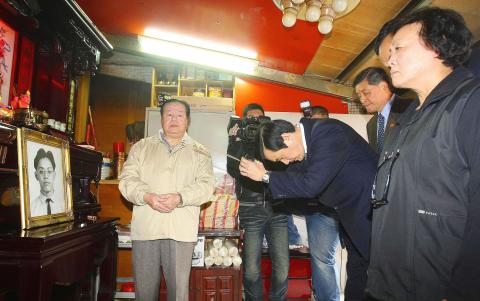|
Ma visits executed man’s family
By Ko Shu-ling / Staff reporter

President Ma Ying-jeou bows yesterday as he
pays his respects to the altar of Chiang Kuo-ching, together with Minister of
National Defense Kao Hua-chu, third right, and Chiang’s relatives, at the Chiang
family home in Taipei.
Photo: Reuters
President Ma Ying-jeou (馬英九) yesterday visited the family of Chiang Kuo-ching
(江國慶), who was wrongfully executed by the military 14 years ago for the rape and
murder of a five-year-old girl, and promised to clear Chiang’s name in a speedy
manner.
Ma apologized to Chiang and his family on Monday through Presidential Office
spokesman Lo Chih-chiang (羅智強), as well as a posting on his Facebook page.
After visiting the family, Ma told reporters that Chiang’s mother and uncle said
they cared more about clearing his name than receiving compensation.
“I have instructed the Ministry of National Defense and Ministry of Justice to
fully assist the family so Chiang can be declared innocent and his family obtain
compensation,” Ma said. “Minister of National Defense Kao Hua-chu (高華柱), who is
also here today, will also do his best to help the family get its wish.”
Ma said his visit and apology demonstrated his administration’s willingness to
help the family see its requests fulfilled.
“The public must realize that my visit today clearly indicates that Chiang is
innocent,” Ma said. “This fact has been confirmed by the investigations of the
Control Yuan and Taipei District Court.”
The family’s wish that Chiang’s conviction and death penalty be revoked has to
proceed in accordance with the law, but he promised the process would not take
five or 10 years, Ma said.
“A retrial is probably the least time-consuming, but we will do our best to
shorten the process,” he said.
However, he declined to specify how long it would take, saying he would ask the
justice ministry to provide an estimate.
He also dismissed speculation that Chiang could not be declared innocent until
another suspect, Hsu Jung-chou (許榮洲), has been proven guilty.
Taipei prosecutors arrested Hsu, who has a record of sexual offenses, as a
suspect in the case on Friday.
Ma said the new evidence discovered could be used against Hsu at a retrial and
clearing Chiang’s name should be dealt with separately from proving Hsu guilty.
Chiang was executed on Aug. 13, 1997, but his family continued to fight to clear
his name.
A Control Yuan report on its investigation said that in notes Chiang wrote in
prison, he recounted being threatened with an electric baton, exposed to strong
light and forced to undergo physical activity all night during his
interrogations.
In letters Chiang sent to his family while in prison, he wrote that
investigators told him “the chief [then-head of air force command Chen Chao-min
(陳肇敏)] is coming to see you. When he arrives, remember to kneel before him and
ask for help. The chief will save you.”
About 30 military officials involved in Chiang’s arrest, trial and execution are
facing criminal and administrative investigations, including Chen.
While Chen also served as minister of national defense under Ma, the president
said he was in no position to say whether Chen or other military personnel
involved in Chiang’s case had been guilty of negligence or should be held
legally responsible for his wrongful conviction and execution.
Chiang’s case has prompted Ma’s long-time friend C.V. Chen (陳長文), the president
of Taiwan’s Red Cross Society, to urge the government to consider abolishing the
death penalty.
Ma said his administration was willing to gradually try for abolition because
the public remains polarized on the issue.
|
![]()
![]()
![]()